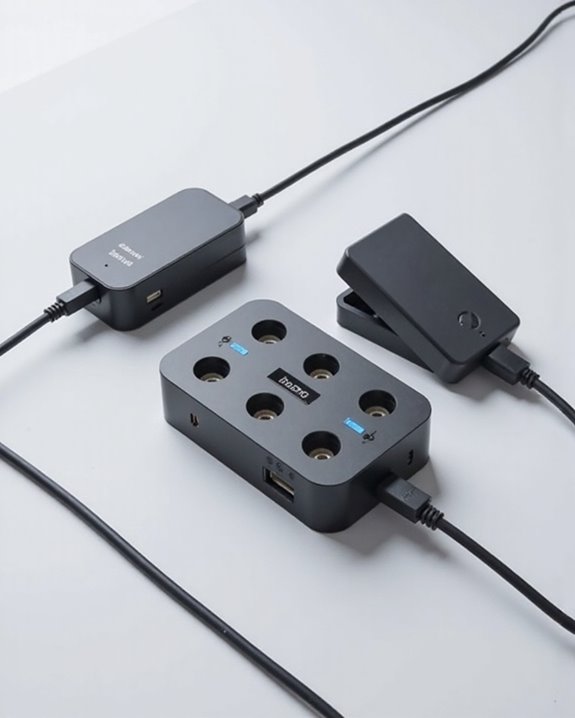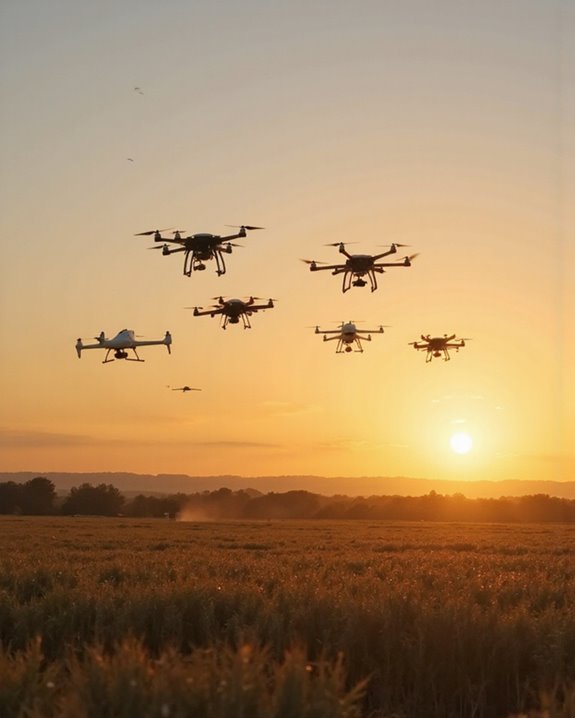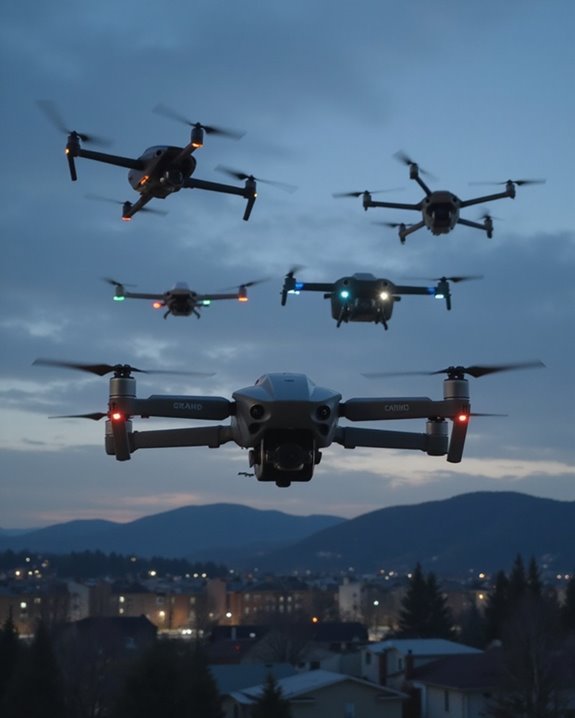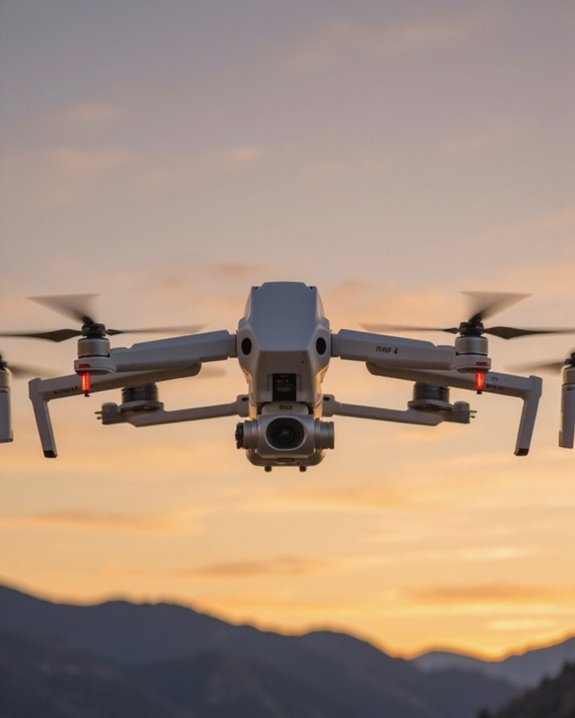Three standout drone battery chargers will transform your flying experience! The E-outstanding Charging Line offers versatile USB compatibility and automatic shutoff, while the SYMA X5 Series 3.7V 650mAh 2-Pack delivers reliable power in a compact design. For serious enthusiasts, the Hobby Fans B6 Mini packs professional features like multi-chemistry support and balance charging. Each option brings unique strengths to the table, and there’s plenty more to discover about maximizing your drone’s power potential.
Key Takeaways
- B6 Mini charger ranks highly with a 4.3-star rating from 500 users and features an intuitive LCD interface for easy operation.
- Multi-chemistry support allows charging LiPo, Li-ion, NiMH, NiCd, and LiFe batteries, making it versatile for different drone models.
- Built-in safety features include overcharge protection, short-circuit prevention, and overheat monitoring for secure battery charging.
- Universal power source compatibility enables charging through USB, phone chargers, or power banks for convenience during travel.
- Compact chargers measuring around 3.5 x 5.3 x 1.1 inches and weighing under 8 ounces ensure excellent portability.
E-outstanding Lithium Battery Charging Line for RC Aircraft
- The USB plug can be connected to the computer, mobile phone charger, mobile power supply for battery charging, easy to use.
- Can be used with XH2.54 revolving JST bus conversion cable, and it can charge 3.7V lithium battery through JST plug, which is more widely used.
- The 3.7V lithium battery can be accurately charged, and it will automatically stop charging after being fully charged without overcharging.
The E-outstanding Lithium Battery Charging Line is a must-have companion for busy drone pilots who can’t afford to wait around monitoring their batteries! You’ll love how this versatile charger connects to your computer, phone charger, or power bank through its USB to XH2.54 connector with JST conversion cable.
Perfect for popular models like the X5C, 818a, and HS170 quadcopters, this smart charger automatically stops when your 3.7V lithium battery is full – no babysitting required! Its compact size means you can slip it in your drone bag and juice up anywhere. Finally, a charging solution that’s as mobile as you are, keeping your aerial adventures going strong.
Best For: RC drone enthusiasts and hobbyists who need a convenient, portable charging solution for their 3.7V lithium batteries across multiple quadcopter models.
Pros:
- Universal compatibility with multiple power sources (USB, phone charger, power bank)
- Automatic shut-off prevents battery damage from overcharging
- Compact and portable design ideal for on-the-go charging
Cons:
- Limited to only 3.7V lithium batteries
- Single charging capability – can’t charge multiple batteries simultaneously
- Requires compatible JST connector on battery pack
3.7v 650mAh Drone Lipo Battery 2-Pack for SYMA X5 Series
- ✈【Drone Lipo Battery】Suitable for syma X serial XH2.54 connector UVA quadcopter drone - SYMA, X5C, X5SW, X5SC, WLtoys V252, XT flyer, Cheerson CX-30(PLEASE NOTE THE...
- ✈【3.7V Rechargeable Battery】You can charging battery at home also outdoor use all power bank, car power, computer to charging
- ✈【Battery Specifications】XH2.54 connector, 3.7v 650mah drone replacement battery, size for 1.73*0.35*0.98 inch, weight for 17.6g each battery
Serious drone enthusiasts flying SYMA X5 series quadcopters will find their perfect power match in this 3.7V 650mAh Lipo battery two-pack. You’ll get reliable performance from these lightweight powerhouses, weighing just 17.6g each and fitting perfectly with their XH2.54 connectors.
These batteries are compatible with multiple popular models including the X5C, X5SW, X5SC, and even the WLtoys V252 and Cheerson CX-30. With a compact size of 1.73×0.98×0.35 inches, they’re small but mighty! The 4.3-star rating from 70 customers tells you they’re doing something right – keeping your drone in the air when you need it most.
Best For: Hobbyist drone pilots who own SYMA X5 series quadcopters or compatible models like WLtoys V252 and Cheerson CX-30 seeking reliable replacement batteries.
Pros:
- Strong compatibility across multiple popular drone models with XH2.54 connector
- Lightweight design at just 17.6g per battery makes them ideal for maintaining flight performance
- Positive customer feedback with 4.3/5 star rating suggests reliable performance
Cons:
- Relatively modest 650mAh capacity may require frequent charging for longer flying sessions
- Limited to 3.7V systems only, not compatible with higher voltage drones
- Being made in China may raise quality consistency concerns for some users
Hobby Fans B6 Mini Professional Battery Balance Charger/Discharger
- High-quality and Safety: The B6 charger is made of high-quality chips and materials to provide you high-quality products and function performance, and the charger also...
- Multiple Battery Compatibility: This B6 charger can charge a variety of rechargeable batteries, including NiCd/NiMH batteries, Li-ion batteries, LiPo batteries, LiFe...
- LCD Display: To facilitate you to choose the mode you need. This B6 charger has a LCD display, you can view all charging status and settings on the charger LCD screen...
Compact yet mighty, Hobby Fans’ B6 Mini Professional charger packs impressive versatility into its palm-sized frame, making it perfect for drone enthusiasts who need a reliable multi-chemistry solution.
You’ll love how this 7.5-ounce powerhouse handles everything from LiPo to NiMH batteries with precision and safety. Its intuitive LCD display keeps you informed while built-in protections against overcharging and short circuits let you charge with confidence. When it comes to performance, the B6 Mini doesn’t disappoint – with 4.3 stars from nearly 500 users, it’s clear this little charger means business! Just remember to grab that recommended adapter tree, and you’ll be ready to keep your drones soaring.
Best For: RC hobbyists and drone enthusiasts who need a compact, versatile charger capable of handling multiple battery chemistries including LiPo, NiMH, and NiCd batteries.
Pros:
- Multi-chemistry compatibility supports wide range of batteries (LiPo, Li-ion, NiMH, NiCd, LiFe)
- Comprehensive safety features including overcharge, short-circuit, and temperature protection
- Compact and lightweight design (7.5 ounces) with intuitive LCD interface
Cons:
- Requires separate power adapter (not included)
- Some users report issues with defective units
- May have limitations with certain battery chemistries’ charging rates
Factors to Consider When Choosing a Drone Battery Charger
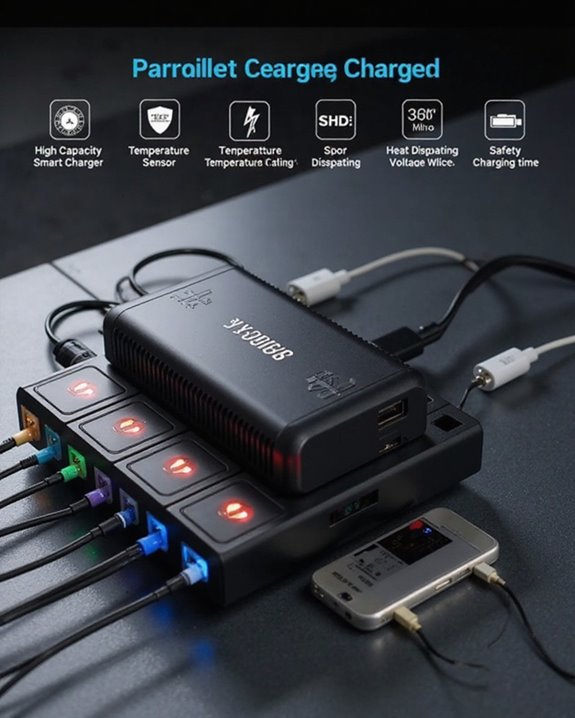
When you’re ready to choose your next drone battery charger, you’ll want to carefully consider several key factors that will impact your flying experience. The most important aspects include matching your battery type (like LiPo, Li-ion, or NiMH), finding a unit with adjustable charging speeds, and ensuring robust safety features like overcharge protection! Your choice should also factor in practical considerations such as power requirements (AC/DC options) and whether you need a compact, portable design for field charging or a larger stationary unit for your workshop.
Battery Type Compatibility
The compatibility between your drone battery and charger plays an essential role in maintaining safe, efficient charging sessions and extending your battery’s lifespan. Before you plug in that charger, you’ll want to make sure it matches your battery’s specific chemistry – whether it’s lithium-ion, nickel-metal hydride, or another type.
Getting the voltage right is essential! Match your charger’s output to your battery’s nominal voltage (typically 3.7V for lithium batteries), and don’t forget to check if it supports your battery’s cell configuration. You’ll need a charger that can handle single-cell or multi-cell setups, depending on your drone’s requirements. Pay attention to those discharge rates and capacity specs too – they’re not just fancy numbers on the box! Finally, make sure your charger has the right connector types for a secure fit.
Charging Speed Options
Selecting the right charging speed for your drone batteries can make the difference between waiting forever to get back in the air and potentially damaging your expensive equipment! While those fast 2A+ chargers might seem tempting (who doesn’t want to zip back into flight mode?), you’ll want to think twice before pushing your batteries too hard.
Most drone batteries, especially lithium-polymer types, are happiest charging at a 1C rate – that’s their full capacity per hour. Look for chargers with adjustable speeds, so you can switch between quick charges when you’re in a hurry and gentler rates for overnight charging. Your future self will thank you for being patient, as proper charging speeds can greatly extend your battery’s lifespan. Remember, a slightly longer wait beats having to replace a fried battery!
Safety Protection Features
Safety features stand as your first line of defense when it comes to protecting those expensive drone batteries! You’ll want a charger that’s equipped with thorough protection systems – think of them as your battery’s personal bodyguards. Look for overcharge protection that automatically stops charging at 4.2V per cell, keeping your batteries from turning into miniature fireballs.
Your ideal charger should include lightning-fast short-circuit protection (under 100 milliseconds), overheat monitoring that kicks in before things get toasty at 50-60°C, and balance charging to keep those cells within 0.05V of each other. Don’t forget about overcurrent protection – it’s like a traffic cop for electricity, making sure your battery doesn’t get overwhelmed! These features aren’t just fancy bells and whistles; they’re essential safeguards for your drone’s power source.
Power Source Requirements
While keeping your batteries safe is paramount, powering up your charger correctly makes all the difference! You’ll want to make sure your charger plays nicely with standard 5V DC power sources – those trusty USB ports are your best friends here.
Don’t skimp on the power supply! Your charger needs at least 1A of current to keep things running smoothly and prevent any unwanted battery drama. For extra flexibility, look for chargers that can handle multiple input voltages (5V to 12V DC), so you’re not tied down to just one power source. Those versatile chargers are like the Swiss Army knives of the drone world! Remember to check that your power connectors match up with common standards – there’s nothing worse than getting a new charger only to find out it won’t connect to your laptop or power bank.
Size and Portability
A perfectly portable drone battery charger can make the difference between a great flying session and lugging around unnecessary bulk! You’ll want to look for compact chargers that measure roughly 3.5 x 5.3 x 1.1 inches – small enough to slip into your jacket pocket or camera bag without taking up precious space.
When you’re out capturing aerial footage, every ounce matters, so opt for a lightweight charger under 8 ounces. The best portable chargers feature streamlined designs with volumes under 20 cubic inches, making them ideal companions for your outdoor adventures. After all, who wants to haul around a bulky charger that feels like a brick? Look for models with slim profiles that’ll keep your drone powered up without weighing you down or requiring a separate carrying case.
Voltage Rating Match
Why risk damaging your expensive drone batteries with an improperly matched charger? Matching your charger’s voltage to your battery’s specs isn’t just smart – it’s essential for keeping your drone in the air and not in the repair shop! You’ll want to check those voltage ratings carefully, making sure your charger’s output aligns perfectly with your battery’s nominal voltage.
For multi-cell batteries (and let’s face it, most drone batteries are), you’ll need to do a bit of quick math. Simply multiply the per-cell voltage by the number of cells to get your target charging voltage. If you’re working with common lithium batteries at 3.7V per cell, don’t guess – check! Your battery’s lifespan depends on proper voltage matching, and who doesn’t want their batteries to last longer?
Multiple Battery Charging
Smart drone pilots know that having multiple batteries is essential for extended flight sessions – but how you charge them matters just as much! When selecting a multi-battery charger, you’ll want to focus on both power and precision.
Look for chargers that offer enough total power output to handle multiple batteries simultaneously – it’s like having a power plant that can run an entire neighborhood! You’ll also want independent voltage controls for each port, letting you fine-tune the charging process for different battery types. Safety features are non-negotiable, with individual overcharge protection being your batteries’ best friend. The most efficient chargers distribute power evenly across ports, which means your batteries will charge consistently and last longer. Trust us, your future self will thank you for investing in a quality multi-battery charging solution!
Smart Charging Capabilities
Modern drone battery chargers pack incredible intelligence into their compact frames – but how can you tell which smart features actually matter?
You’ll want to look for chargers with automatic battery detection and voltage adjustment – these smart cookies know exactly how to treat your specific battery type! The best models include cell balancing technology that keeps all your battery cells working in perfect harmony, extending their lifespan. Real-time monitoring displays let you track charging progress like a pro, while built-in overcharge protection gives you peace of mind. Some chargers even store your battery’s charging history and health data, so you’ll know exactly when it’s time for maintenance. Think of these features as your battery’s personal health coach, working behind the scenes to keep your drone flying longer and safer.
Frequently Asked Questions
How Long Does It Typically Take to Recharge a Completely Drained Drone Battery?
Just like waiting for your iPhone to charge back in 1985 (wink), drone battery charging times can vary. You’ll typically wait 60-90 minutes for a full charge on consumer drones like the DJI Mini 2 or Mavic Air 2. Higher-capacity professional batteries might need 2-3 hours to juice up completely. But here’s a pro tip: you’ll want to invest in a quality charger and never let your batteries drain completely – it’s better for their longevity!
Can I Charge Multiple Drone Batteries Simultaneously With a Single Charger?
Yes, you can charge multiple drone batteries at once – many modern chargers come with multi-battery capabilities! Most professional charging hubs let you power up 2-4 batteries simultaneously, which is a huge time-saver. You’ll find options like DJI’s Multi-Battery Charging Hub or the Energen DroneMax, which cleverly charge your batteries in sequence based on power levels. Just remember that charging multiple batteries typically takes a bit longer than charging just one.
What Safety Precautions Should I Take When Charging Drone Batteries Outdoors?
When charging your drone batteries outdoors, always place them on a fire-resistant surface and keep them away from direct sunlight and moisture. You’ll want to monitor the temperature – if they’re getting too hot, move them to a cooler spot! Never leave charging batteries unattended, and keep them away from flammable materials. For extra safety, consider using a LiPo charging bag and staying within sight of your batteries during the entire charging process.
Are Third-Party Drone Battery Chargers Safe to Use With Branded Drones?
While third-party chargers can work, you’ll want to be careful with your expensive drone! Stick to chargers from reputable manufacturers that specifically list compatibility with your drone model. Many third-party options lack important safety features like temperature monitoring and overcharge protection. You’re better off investing in an OEM (original equipment manufacturer) charger – it’s worth the extra cost to protect your drone and avoid potential battery damage or failure.
Do Drone Battery Chargers Work With Different Voltage Batteries From Other Devices?
You’ll want to be extra careful about using drone chargers with other devices – it’s not typically recommended! While some chargers might work with different voltages, using the wrong charger can damage your battery or even create safety hazards. Most drone batteries require specific charging protocols and voltages, so it’s best to stick with chargers designed for your exact battery model. Think of it like matching puzzle pieces – they need to fit perfectly!

